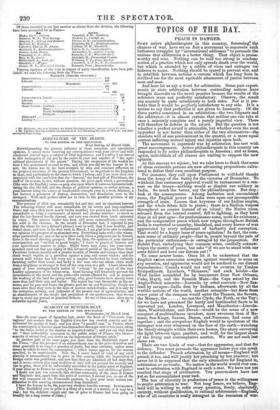AGRICULTURE OF THE SEASON.
TO THE EDITOR OF THE SPECTATOR.
West Surrey, 3d March 1846.
Notwithstanding the present influence of short memories and speculative opinions, I cannot resist renewing my correspondence with your clever and well- conducted journal upon a subject of vital importance; and I confess I am moved to this resumption of my pen by the notice in your last number of " the agri- cultural phrcnomena of the season." During the suspension of the weekly no- tices I was accustomed to send to you, and which youdid me the honour to in- sert, the hiatus has by me been occupied by deep and constant reflection on the proposed measures of the present Government, so important to the kingdom at large, and particularly to the class to which I belong; and I am more than ever impressed with the conviction that the "harvest," the best gift of Providence, the staff of life to man, is also, without question, the pivot upon which a government (hip unto the English) turns—a o qp also upon which it rests—a barometerindi-
caung the rise, the fall, and the ge of political opinions, or rather actions • a good harve,st being the source of incalculable strength even to a weak Ministry, a bad harvest a precursor of dismay, destruction, and dissolution, even to the strongest. With such preface allow one to turn to the peculiar province of my communications.
The summer of 1844 was remarkably hot and dry, and an abundant harvest. The following winter still more remarkable for its severe and long-continued frost; and since then (now nearly twelve months) the period has been still more remarkable as being a continuance of humid and gloomy weather; so much so that the late harvest hardly ripened, and corn was carried from lands saturated by water. The present winter has been still- more extraordinary,—very wet, but mild in the extreme. In the month of 'December last, I reported to you that the wheat (to use a farmer's phrase) went in well, that it rose healthy, and looked stout; and now, in the first week in March, I am glad to be able to confirm my opinions of a prospect of anabundant crop. Everything looks well,—the wheat- crops particularly so; and so far as in these early times a judgment can be formed, there is the most cheering prospect. How far, then, the opinions of your alarmed correspondent are "entitled to great weight," I leave to practical farmers and your agricultural readers to judge. Slight 'frosts may come; but your corre- dent need not fear any injury at this advanced period of the year from frost.
videni farmers usually sow a greater breadth of Swedes and turnips than their stock would require, as a provision against a long and severe winter; and the present mild winter has left every one a surplus unchecked by frost, certainly recurring earlier than usual; and lucky is the man who can obtain extra stock from a neighbour or stranger to feed off the crop even at a gift. I have above dis- pmed of your correspondent's notice of "vermin" by my report of the very healthy appearance of the wheat-crop. Good farming will invariably prevent the devastations of the worm and the grub—the vermin alluded to; and as respects the working of the land for spring-sowing, why, good farmers have already sown more than half their oats and barley. The season has been favourable in the ex- treme, and for peas and beans the greater part are up and flourishing. People are more alive than they were in the days of ancient smock-frocks; and it is only by the enterprise, activity, and judgment of the present race of agriculturists, and an abandonment of the delays and prejudices of our predecessors, that we can hop to stand our ground as practical farmers. As one of that class, allow me to


























 Previous page
Previous page